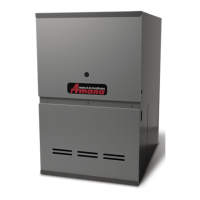5
• A return air temperature range between 60ºF (16ºC)
and 80ºF (27ºC) is maintained.
• Air lters are installed in the system and replaced
daily during construction and upon completion of
construction.
• The input rate and temperature rise are set per the
furnace rating plate.
• 100% outside air must be used for combustion during
construction. Temporary ducting may be used to
supply outside air to the furnace for combustion – do
not connect this duct directly to the furnace. Size this
duct according to NFPA 54/ANSI Z223.1 section for
Combustion and Ventilation Air
• The furnace heat exchanger, components, duct
system, air lters and evaporator coils are thoroughly
cleaned following nal construction clean up by a
qualied person.
• All furnace operating conditions (including ignition,
input rate, temperature rise and venting) are veried
by a qualied person according to these installation
instructions
• Furnace doors must be in place on the furnace while
the furnace is operating in any mode
• Damage or repairs due to failure to comply with these
requirements are not covered under the warranty.
NOTE: The Commonwealth of Massachusetts requires that
the following additional requirements must also be met:
• Gas furnaces must be installed by a licensed plumber
or gas tter.
• A T-handle gas cock must be used.
• If the unit is to be installed in an attic, the passageway
to and the service area around the unit must have
ooring.
T
O
PREVENT
PROPERTY
DAMAGE
,
PERSONAL
INJURY
OR
DEATH
DUE
TO
FIRE
,
DO
NOT
INSTALL
THIS
FURNACE
IN
A
MOBILE
HOME
,
TRAILER
,
OR
RECREATIONAL
VEHICLE
.
WARNING
To ensure proper furnace operation, install, operate and
maintain the furnace in accordance with these installation
and operation instructions, all local building codes and
ordinances. In their absence, follow the latest edition of the
National Fuel Gas Code (NFPA 54/ANSI Z223.1) and/or local
plumbing or waste water codes, and other applicable codes.
A copy of the National Fuel Gas Code (NFPA 54/ANSI Z223.1)
can be obtained from any of the following:
American National Standards Institute
25 West 43rd Street, 4th Floor
New York, NY 10036
National Fire Protection Association
1 Batterymarch Park
Quincy, MA 02169-7471
CSA International
8501 East Pleasant Valley
Independence, OH 44131
The rated heating capacity of the furnace should be greater
than or equal to the total heat loss of the area to be heated.
The total heat loss should be calculated by an approved
method or in accordance with “ASHRAE Guide” or “Manual
J-Load Calculations” published by the Air Conditioning Con-
tractors of America.
In the USA, this furnace MUST be installed in accordance with
the latest edition of the ANSI Z223.1 booklet entitled “National
Fuel Gas Code” (NFPA 54), and the requirements or codes of
the local utility or other authority having jurisdiction. Additional
helpful publications available from the NFPA are, NFPA 90A
- Installation of Air Conditioning and Ventilating System and
NFPA 90B - Warm Air Heating and Air Conditioning System.
All venting shall be in accordance with the National Fuel Gas
Code, ANSI Z223.1, or applicable local building and/or air
conditioning codes.
NOTE: Furnaces with NOx screens meet the California NOx
emission standards and California seasonal efciency stan-
dards. ANNUAL inspections of the furnace and its vent system
is strongly recommended.
loCation requirementS and ConSiderationS
Your unit model type determines which installation proce-
dures must be used. For *MVC80 models, you must follow
instructions for Horizontal Left, Horizontal Right or Upow
installations only. These furnaces are not approved for Down-
ow installations.
*CVC80 models may be installed in the Downow position as
well as Horizontal Left & Horizontal Right positions.
T
O
PREVENT
POSSIBLE
EQUIPMENT
DAMAGE
,
PROPERTY
DAMAGE
,
PERSONAL
INJURY
OR
DEATH
,
THE
FOLLOWING
BULLET
POINTS
MUST
BE
OBSERVED
WHEN
INSTALLING
THIS
UNIT
.
WARNING
Follow the instructions listed below when selecting a furnace
location. Refer also to the guidelines provided in the Com-
bustion and Ventilation Air Requirements.
• Centrally locate the furnace with respect to the
proposed or existing air distribution system.

